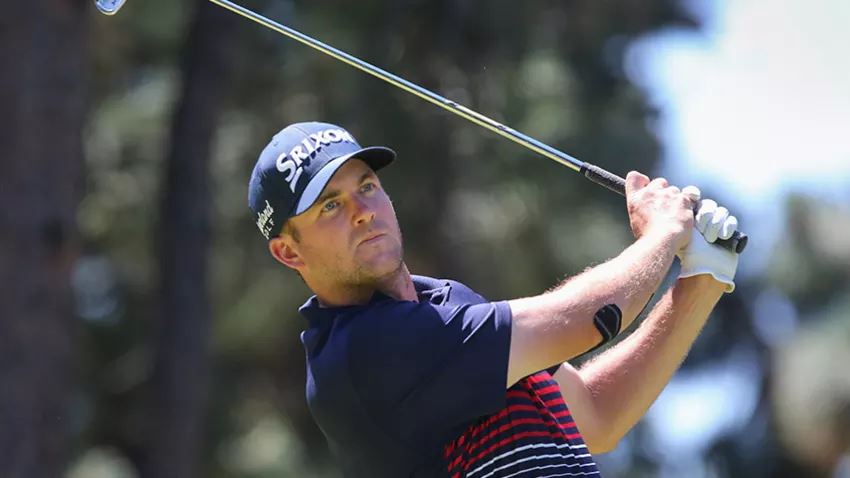The golf world was hooked on the young Canadian after watching him hit the ball off the tee, and it seemed like it was all-systems-go for a tremendous professional career.
He lived up to the hype in his first Mackenzie Tour season, where he notched three runner-up finishes and was third on the Order of Merit (the highest result for a non-winner in Mackenzie Tour history). After a solid performance at Q-School that winter, he earned a spot on the Web.com Tour for 2016.
He finished tied for fourth in just his second event on the Web.com Tour, but his wrist woes began at his sixth event of the season.
He missed 14-of-20 cuts that year and finished 96th on the money list.
“It’s been super frustrating for the last two years,” he said. “I had a great year in Canada (in 2015) and had a really good start to my Web.com Tour career … and I was in a good spot. I wanted to keep going.”
Pendrith says the fact that he’s generally a positive person has been key over the last 24 months, admitting it would have been easy to get down on himself.
He continues to work on his swing with Derek Ingram, the head coach of Golf Canada’s Men’s National Team, but he attributes the work he’s done with Dr. Adrienne Leslie-Toogood, Golf Canada’s sports psychologist, as the key to getting through the recent trying times.
“When you think of a guy like Taylor (Pendrith) … he’s such a great athlete and he’s super relaxed, so when things like (the injuries) happen, you have to remember who you were and what you need to get back in order to give yourself a chance to play well,” said Leslie-Toogood, who is based in Winnipeg.
While recovering from his injuries Pendrith has also worked on becoming more of a complete player.
Pendrith can still hit the ball further than almost anyone on the planet, but it was the work he did when he was unable to hit full shots during his recovery that turned his short-game weaknesses into strengths.
He says he’s changed putter grips this year, giving him more confidence than he’s “ever had” while putting. And so far this year on the Mackenzie Tour he’s made 51 birdies –only three players on Tour have more.
With a laugh, Pendrith said he used to “obviously” hit a “ton of drivers” because that was his strength, but he’s since learned that hitting a 2-iron that goes 290 yards down the middle isn’t a bad thing either.
“I’ve just learned to tone it back and learn that it’s not always a long drive contest,” he said.
Some of Pendrith’s closest friends have also become beacons of inspiration for him, as he saysthe success of Mackenzie Hughes and Corey Conners has been just as important as his own self-belief.
The trio played a lot of golf together growing up, and all went to Kent State University while also teammates on Golf Canada’s National Team. Pendrith and Conners were both in Hughes’ wedding party a few years ago, and Pendrith said he’ll be the best man at Conners’ wedding this fall.
Their goal at Kent State was to get to the PGA TOUR together, and two out of three have realized that dream. Conners is in his rookie season and already has a top-10 finish to his name, while Hughes is in his second year (after winning in his first).
After Hughes’ breakout rookie year on the Mackenzie Tour in 2013, he struggled on the Web.com Tour the following year and returned for another year in Canada. With more experience under his belt, he won the Web.com Tour and then, of course, on the PGA TOUR.
Pendrith said he’s focused on the process with hopes of winning on the Mackenzie Tour this year and moving up to the Web.com Tour next season, not unlike what Hughes did.
“I’m just staying patient and taking it one step at a time,” he said. “Seeing the success (Conners and Hughes have) had so far, it’s been awesome to watch and makes me feel like I can compete out there as well because I’ve played with them so much.”
Leslie-Toogood, who has also worked with both Hughes and Conners, says the comparative nature of golfers is one that is almost unavoidable. It happens because the sport, which is so individualistic, has everyone climbing to different levels of the professional ranks at different times.
“The thing to recognize is that in a sport like golf it’s a very long journey and a very long process. Everyone is going to get there in a different way and a different time,” said Leslie-Toogood. “It’s never a linear kind of journey. You have to recognize you’re on your own path and enjoy where you are right now and keep doing the work you need to do to get yourself better and get yourself where you need to go.”
Despite the setbacks, Pendrith has never doubted himself.
His support system is solid – between his TOUR-bound friends, his coaching squad and his longtime girlfriend Meg (a nurse in Ontario) – and he knows he has the game to compete with the best in the world.
“You can get down on yourself, but I’m trying to stay positive and it’s worked out,” he said. “I’m playing fine again and getting better every week. I know I made the right decision taking that time off.”
He said he knows when he’s playing well he can compete with guys on the Web.com Tour and the PGA TOUR, so he’s not worried about the future. His mind is more wrapped around the present, where he’s healthy.
Finally.




